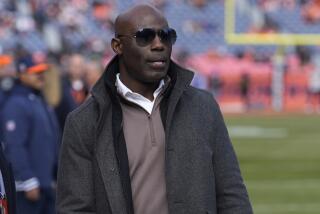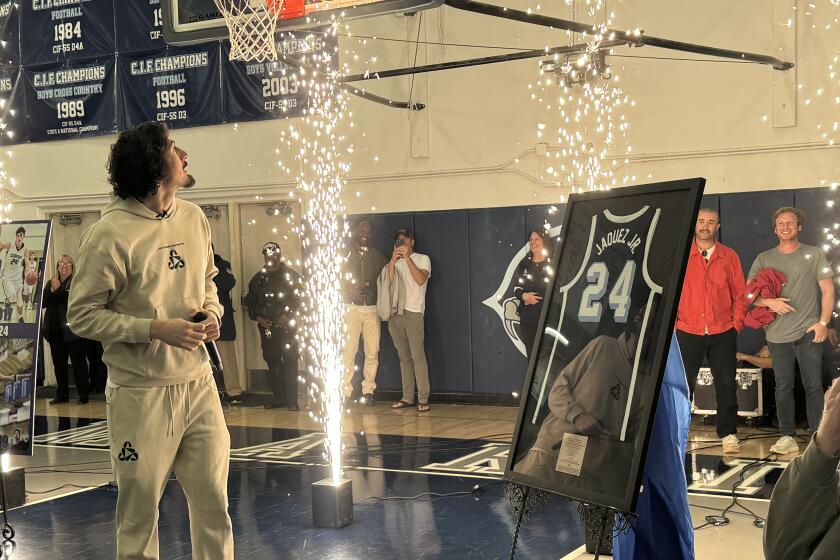Owens Can’t Break Free From This Coverage
DALLAS — After finishing with midday practice -- and informing a phalanx of media that he would not be making any comments -- Terrell Owens settled down to eat lunch on a couch in the middle of the Dallas Cowboys locker room.
A dozen cameras snapped around to record his first bite, reporters watching intently. With an exaggerated sidelong glance, Owens packed up his sandwich and ducked through a curtain to the relative privacy of the trainer’s room.
Sitting at a locker a few feet away, veteran cornerback Aaron Glenn figured his teammate had reason to be upset.
“Every small thing he does,” Glenn said to reporters, “you guys write about it.”
Not much chance of that changing on Thursday, with the volatile receiver’s latest psychodrama continuing to fascinate this city.
A short time later, Dallas police announced that Owens’ much-publicized trip to the emergency room on Tuesday night had been classified as an accidental overdose.
Initial reports had called it a suicide attempt; Owens had said he became groggy from an allergic reaction to pain medication.
As officials concluded their investigation, fans in sports bars and on Internet sites alternately fretted over Owens’ well-being and debated whether the gifted but controversial player was worth the hassle. The policemen’s union got involved too, demanding an apology for statements made by Owens’ publicist.
Coach Bill Parcells, who faced a second day of questions on the matter, was left to muse about something his father used to tell him when he got in trouble.
“It’s never your fault but you’re always there -- that’s what he used to say to me,” Parcells recalled. “Some people just seem to have a penchant.”
The 911 call that marked the start of Owens’ latest trouble was released by authorities Thursday evening.
His publicist, Kim Etheredge, sounds distraught as she says: “I think he took too many pills. ... Oh God.” She neither identifies Owens by name nor mentions “suicide.”
The Dallas Morning News reported Thursday that Owens had just broken up with his fiancee and was upset about not being able to see his young son, who lives in California and celebrated a birthday this week.
Owens, recovering from a broken hand but hopeful of playing against Tennessee on Sunday, discounted initial reports that he took 35 Hydrocodone pain pills, saying he became groggy after taking several pills in combination with dietary supplements.
Police said their investigation supported Owens’ version of how many pills were ingested.
In Los Angeles, a USC associate professor of clinical pharmacology said that, in general, it is unlikely a supplement could change how Hydrocodone affects the body. Gregory Thompson also said a true allergic reaction usually involved severe difficulty breathing or nausea.
Thompson added that a person could be significantly affected by taking only four or five Hydrocodone in a short period of time.
If nothing else, it is clear that controversy is finding Owens with increasing haste at each stop of his pro football career.
Starting with the San Francisco 49ers, he enjoyed a number of relatively peaceful seasons before criticizing his coach and questioning his quarterback’s sexuality. Traded to the Philadelphia Eagles, he lasted a season before bickering with his new quarterback.
The Cowboys made it only three games before encountering an Owens-related controversy.
His new teammates said they expected a certain amount of turmoil when Owens arrived this season, Glenn said. Rookie linebacker Bobby Carpenter said that because Owens smiles and shrugs it all off, he can too.
“What makes him worth it?” cornerback Terence Newman asked. “The whole mystery of us making the Super Bowl. He’s a great player.”
Outside the team, there was not as much empathy.
A Dallas radio station played soap opera music in the background as the announcer intoned: “Stay tuned all season long to ... As the T.O. Turns.”
“I don’t care how much he can help your team,” Jennifer Floyd Engel, a Fort Worth Star-Telegram columnist, said on her morning radio show. “There’s going to be a day like yesterday -- do you want that around your team?”
Postings to fan websites seemed evenly divided between those concerned about Owens and others worried about the team’s success.
“I can’t wait for the day when this clown and his popcorn are sent packing,” one posting read. “He’s nothing but a distraction with his bipolar mental problems.”
Parcells, meanwhile, was compared to the Sergeant Schultz character in “Hogan’s Heroes” who continually insists, “I know nothing.” Even greater venom was directed at Etheredge.
During a Wednesday news conference, the publicist referred to Owens’ lucrative contract, saying: “Terrell has 25 million reasons why he should be alive.” She also accused police of lying in their initial report, which said that Owens acknowledged trying to harm himself.
Owens later said he was too dazed that night to answer questions coherently. Police stood by their report, saying it reflected the information available at the time.
On Thursday, the Dallas Police Assn. demanded an apology from Etheredge.
“I tell you what, she has some nerve,” said Glenn White, the association’s president. “Those officers did an accurate report.”
White also expressed amazement at all the commotion stirred by the incident, the water-cooler talk and newspaper headlines.
“It’s just a football player,” the union executive said. “Who cares?”
More to Read
Go beyond the scoreboard
Get the latest on L.A.'s teams in the daily Sports Report newsletter.
You may occasionally receive promotional content from the Los Angeles Times.











